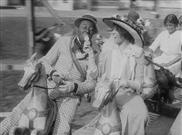|
|
||||
|
|
by Donald Levit  Malcolm X lamented “being the only Negro in the theater, and when Butterfly McQueen went into her act, I felt like crawling under the rug.” No more, although the sword cuts both ways in the Museum of Modern Art’s “100 Years in Post-Production: Resurrecting a Lost Landmark of Black Film History” exhibition accompanied by the world première of assembled rushes in the annual To Save and Protect project. The found footage of two thousand cans, seven reels, dailies, multiple takes introduced by handheld pre-clapstick number slates, along with nine hundred negatives and/or stills constitutes the earliest extant feature with an authentic mostly African-American cast and crew, with white producers Klaw and Erlanger. “Authentic” in that the untitled unreleased work includes some few white actors but not whites in blackface, as was common practice (and also for Native Americans). “Extant” in that contemporaneous The Pullman Porter and Uncle Remus’ First Visit to New York and the slightly earlier short, A Fool and His Money, have not re-appeared and, along with as much as three-quarters of silent-era American films, must be considered irretrievably lost to time, decay, indifference and accident. Indeed, this priceless historic material was near to going the same way, scheduled for burning at the New Jersey storage vault of trust-busted defunct Biograph Studio and then sitting unrecognized and uncatalogued at MoMA until 1976 and only now partially restored after a decade of refining and researching and referred to simply as “Unidentified Bert Williams Lime Kiln Club Field Day” rushes. It remains unclear why the film was never polished and released, although Associate Film Department Curator Ronald S. Magliozzi suggests that Biograph grad D.W. Griffith’s 1915 The Birth of A Nation so exacerbated feelings in a period inured to lynchings and offensive stereotypes, that, even with two white directors -- African-American theater man San Croker, Jr., was essentially a third -- the soon-to-be-dissolved studio shelved it. With no credits, main- or inter-titles to help, the reassemblage crew had to piece things together through, for instance, early twentieth-century news and entertainment articles and advertisements, participants’ schedules, sheet music and gramophone recordings, common sense, and even lip-reading. The story that seems to emerge is that of a middle-class comedy out of Harlem musicals like Darktown Follies in combination with popular minstrel shows channeled through the Lime Kiln Club stories already adapted for the stage. To Donald Sosin’s live piano accompaniment, the forty minutes of 35mm are expanded by another quarter-hour of variant multiple takes and behind-the-scenes non-acting racially mixed cast and crew camaraderie, and they conclude with three apparently never-decided-upon alternative endings of a kiss that may well be the very first non-comedic celluloid treatment of romance involving persons of color. Much of the still partially unidentified cast of more than half-a-hundred was recruited from the active Harlem entertainment community for this filming in the Bronx and possibly Englewood across the Hudson. One of the two stars is Bert Williams, with little question the nation’s first black superstar, on Vaudeville and Broadway and a successful recording artist, comedian and mime who to friend and admirer W.C. Fields, was “the funniest man I ever saw -- and the saddest man I ever knew.” Why the Bahamas-born mixed-race actor used blackface and is even shown being so made up, is a debatable issue, though it was not unheard-of among black performers at the time. In any case, “worthy of comparison to Charles Chaplin” and in odd shoes that do give him a Little Tramp-like shuffle, the big tall Williams has an equally imposing costar and love interest in tall Odessa Warren Grey, soon to leave the field for lucrative “Odessa Millenary: Exclusive Parisian Creations for the Smartly Dressed Woman.” Williams triumphs over two and more other suitors for the attentive company of Grey’s local belle at the Lime Kiln social club’s marching band parade, athletic competitions, fair rides, eats and grand ball showcasing the all-the-rage cakewalk popularized earlier by him and his stage partners Mr. and Mrs. George W. and Aida “Queen of the Cakewalk” Overton Walker. Williams is not hesitant to pull a bit of money-making “Gin Well” petty larceny but uses the ill-gotten cash for food and merry-go-round and brass rings for me and my gal. In the fair lady’s disapproving, pot-emptying mother (Abbey Mitchell), a watermelon-eating competition, “de libray” and “no credit to nobody” signs, and group drinking, the film is, by today’s standards, arguably racist stereotyped. To ever-vigilant PC police, so are Amos n’ Andy, whether radio whites or TV black, and so many films including some Marx Brothers scenes presently cut for U.S. showings and The Godfather, and, religiously or ethnically, presumably The Goldbergs, I Remember Mama, and All in the Family. This MoMA restoration nevertheless humanizes its African-Americans, a first of its kind. Magliozzi wisely indicated that this print is not definitive but that the hope is African-American scholars and community members will see fit to flesh out and complete this that is merely a start. |
||
|
© 2024 - ReelTalk Movie Reviews Website designed by Dot Pitch Studios, LLC |



